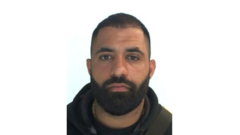Authorities' actions reflect their fear of losing control ahead of the presidential election, as protests grow stronger for Imamoglu's release.
**Turkey Tightens Grip on Dissent as Erdogan's Rival Faces Increased Censorship**

**Turkey Tightens Grip on Dissent as Erdogan's Rival Faces Increased Censorship**
The blocking of Istanbul's jailed mayor Ekrem Imamoglu's social media account raises concerns about freedom of expression in Turkey.
In a significant move that silences one of Turkey's leading opposition figures, officials have blocked the social media account of Istanbul's jailed mayor, Ekrem Imamoglu. This drastic measure halts his communication with the 9.7 million followers on X within Turkey, though the platform remains accessible internationally. Imamoglu has relied on this digital channel to address his supporters and maintain visibility while imprisoned.
On March 19, Imamoglu, a prominent rival to President Recep Tayyip Erdogan, was arrested amid high-stakes political tensions. His Republican People's Party (CHP) condemned the social media ban, likening it to a "coup attempt" against the imminent presidential election, scheduled for 2028. CHP Secretary General Selin Sayek Boke highlighted the administration's desperation, stating, "They won't even allow him to speak to the public," indicating widespread fears among power-holders.
Despite the legal blockade on his account, which was attributed to a legal demand, a lawyer for X is contesting this restriction, citing free speech concerns. Istanbul prosecutors are probing Imamoglu's previous posts, considering them a potential incitement to unrest. A particular message calling for unity against his arrest sparked the investigation.
Human rights advocates assert these developments are part of an escalating crackdown on civil liberties in Turkey. Imamoglu's supporters argue the corruption allegations against him, which he vehemently denies, are politically motivated. Recently, Imamoglu called for a protest in Istanbul that drew tens of thousands, reflecting a significant public backlash against the suppression of dissent.
As tensions simmer, these events underscore the fraught atmosphere in Turkey leading up to future elections. While protests continue to emerge across the nation, the extent of governmental control over dissent remains a critical issue as civil society strives for its voice amid increasing risks. The political climate remains volatile, with many observers questioning the future of democracy in the nation under Erdogan's administration.
On March 19, Imamoglu, a prominent rival to President Recep Tayyip Erdogan, was arrested amid high-stakes political tensions. His Republican People's Party (CHP) condemned the social media ban, likening it to a "coup attempt" against the imminent presidential election, scheduled for 2028. CHP Secretary General Selin Sayek Boke highlighted the administration's desperation, stating, "They won't even allow him to speak to the public," indicating widespread fears among power-holders.
Despite the legal blockade on his account, which was attributed to a legal demand, a lawyer for X is contesting this restriction, citing free speech concerns. Istanbul prosecutors are probing Imamoglu's previous posts, considering them a potential incitement to unrest. A particular message calling for unity against his arrest sparked the investigation.
Human rights advocates assert these developments are part of an escalating crackdown on civil liberties in Turkey. Imamoglu's supporters argue the corruption allegations against him, which he vehemently denies, are politically motivated. Recently, Imamoglu called for a protest in Istanbul that drew tens of thousands, reflecting a significant public backlash against the suppression of dissent.
As tensions simmer, these events underscore the fraught atmosphere in Turkey leading up to future elections. While protests continue to emerge across the nation, the extent of governmental control over dissent remains a critical issue as civil society strives for its voice amid increasing risks. The political climate remains volatile, with many observers questioning the future of democracy in the nation under Erdogan's administration.






















